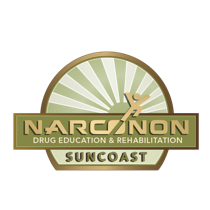April is Alcohol and Drug Awareness Month, and at Suncoast Rehabilitation Center we wanted to recognize this by listing ten signs of alcoholism. Our hope is that this will help alcoholics and those around alcoholics recognize the problem and get help.
#1: Feeling a strong compulsion to drink

Alcoholics often feel that they need to drink all of the time, or try to solve problems in their lives by drinking. The average American drinks four alcoholic beverages a week. If you or someone you know chronically drinks more than this, or can’t seem to stop drinking, they likely have an alcohol problem.
Additionally, if a person needs a drink just to get up in the morning, or at odd times of day in order to function, they are likely an alcoholic.
#2: Getting withdrawal symptoms when they stop drinking
People who drink every single day can experience withdrawal symptoms when they stop drinking. This is because their body becomes dependent upon alcohol to accomplish certain functions.
Some of the withdrawal symptoms a person can experience are as follows: anxiety, depression, fatigue, irritability, nightmares, mood swings, shakiness, loss of appetite, insomnia, nausea, vomiting, speeded heart rate, tremor, fever, seizures, confusion, hallucination, and more.
They often occur within 5-10 hours after the last drink – but can occur days after the last drink. The symptoms get worse in 48-72 hours, and can persist for weeks.
#3: Drinking in situations where it’s dangerous
If a person can’t put aside a drink long enough to become sober and drive home, or they drink on the job when working with heavy equipment, or when drinking can lose the person that job, but the person drinks anyway, it’s time to consider that they have a drinking problem.
#4: Self medicating with alcohol
When a person turns to alcohol as a solution to their problems, they are more likely to become alcoholic. They are using alcohol as a crutch and are less likely to actually solve the root of their difficulty because of the alcohol, so it becomes a vicious cycle.
#5: Drinking too much consistently
Getting “black out” drunk (so drunk you can’t remember what happened for a time period) is extremely dangerous on a one-off basis. It can leave you vulnerable to doing illegal or unconscionable things that you would never do sober. If a person is consistently getting black out drunk or even “just” getting drunk every day, their friends and family need to discuss the possibility that they me be an alcoholic.
#6: Depression

Alcohol is actually called a depressant. This is because it lowers your breathing rate and your heart rate. But, alcohol can also cause depression. It can get complicated if a person is already depressed and the person turns to alcohol, because alcohol can actually make their depression worse. They may feel great on the alcohol, but as soon as they start to sober up, the depression can hit them even harder. However, if a person isn’t depressed in the first place, alcohol can make them depressed. So, in order to understand what is really wrong with the person or a part of their life, they must first get off the alcohol.
#7: Hiding stashes of alcohol in unlikely places
Bringing alcohol to work, keeping it in the laundry room, or stashing it in the glove box is not normal. If you are drinking so much alcohol that you feel you need to hide your use from your loved ones – or you simply don’t feel “right” unless you have a drink on hand – or you need a drink to function, you are likely an alcoholic.
#8: Experiencing legal problems because of alcohol
Getting in trouble with the law is never a good thing. But if a person starts to get in trouble with the police or with their loved ones because they are doing illegal things either under the influence of alcohol or to obtain more alcohol, they are experiencing an addictive behavior. If a person has to steal in order to get more of a drug of any sort, they are likely addicted to that drug. Additionally, if a person’s relationships with those they love or with the society they belong to is deteriorating because of a drug, they should seek help.
#9: Picking certain types of drinks to get yourself drunker, faster
I had a friend who used to chug three of the worst tasting beers I’ve heard of because – though he hated the taste – he wanted to get drunk fast. He would later throw up and mourn the loss of all the drinks he’d put into his body, because now he’d have to drink more to maintain his drunkenness. This person was an alcoholic. He chose specific drinks not for the enjoyment of a foodstuff, like someone might with a good wine or a chocolate soufflé, but just to get as wasted as possible as fast as possible.
Additionally, a person who drinks consistently will become tolerant to alcohol, and will need more of it to become drunk. This is why they may begin to drink cheaper alcohols, because they can’t get drunk with what they can afford in more expensive drinks.
#10: Becoming irritable or anxious when the time comes that you normally have a drink
drug free rehabilitation program. Call us for a confidential conversation at 877-850-7355.

If you or someone you know is demonstrating any of the above signs, contact us today.
Refs: Gallup Poll, Mayo Clinic, NIH, HelpGuide.org, Treatmentsolutions.com, Webmd.com
